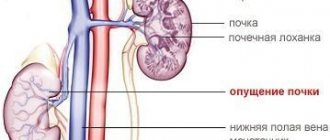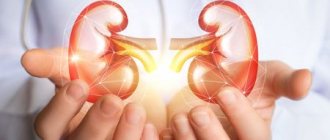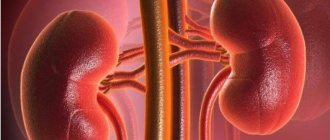If the average resident has problems with the kidneys during any examination, then most are sent to a clinic or medical center to see a urologist, since this specialist is always well-known. But few people know that with some problems in this area it is necessary to contact his colleague, a nephrologist. What is the difference and when to whom to run for help? Both doctors, of course, treat kidney diseases. But a urologist is a surgical specialist. In most cases, he considers those diseases that require surgical intervention (for example, tumors, large stones, renal colic, developmental abnormalities, etc.). If necessary, he performs the necessary operation, although, of course, he treats “without a knife.” In addition, the urologist also deals with the treatment of problems of the “lower floors” of the genitourinary sphere (ureters, bladder), “male diseases” (for example, prostatitis or prostate adenoma). The nephrologist tries to cope with some problems conservatively, without surgery. It is connected if, against the background of a urological or other disease, there is renal failure or other significant damage to the kidney.
In general, you need to understand that these two specialists organically complement each other, and if you are redirected from one doctor to another, this is a harmonious optimization of the treatment process. The result is successful assistance to the patient and a solution to many “painful” kidney problems.
So, a nephrologist can help you successfully manage most kidney diseases. He observes and competently guides patients, helping them solve problems to optimize treatment, prescribing the right diet and selecting the optimal medications for impaired renal function, as well as for diseases where the kidneys are affected secondarily.
What do nephrologists treat?
Doctors in this specialty treat congenital and acquired pathologies.
The first group includes:
- kidney prolapse;
- doubling or underdevelopment of one of the organs;
- violation of the internal structure;
- intrauterine infection.
Kidney pathology can be diagnosed at the stage of gestation. During screening ultrasounds in the second and third trimester, the doctor will identify the problem.
Acquired diseases develop after birth.
These include:
- glomerulonephritis;
- pyelonephritis;
- abscesses of the kidneys, perinephric space;
- secondary lesion in the presence of a primary focus of infection.
Autoimmune diseases, metabolic disorders in the body, such as SLE, diabetes, rheumatism, lead to impaired kidney function.
Nephrologists treat the consequences of injuries: bruises, contusions.
When is the best time to start your visit with a consultation with a nephrologist?
Of course, for the most common “renal” complaints:
- pain in the lumbar region (“in the kidney area”);
- changes in the color and smell of urine, the appearance of foreign inclusions and impurities (including sediment) in the urine;
- urination disorders (frequent, painful urination, significant decrease or excessive increase in the amount of urine);
- the appearance of swelling of the arms, legs, face, eyelids.
A consultation with a nephrologist will help identify kidney damage, the stage and severity of the process; will facilitate the prescription of preventive treatment (including proper diet and lifestyle), which will significantly improve your condition and the functioning of the urinary system. The main thing is that it will protect your kidneys from the rapid progression of disease damage when the kidneys become the target of the disease. And constant monitoring by a qualified “narrow” specialist will help you better understand what is happening and keep the situation under control.
Nephrology: diagnostics
For kidney diseases, instrumental and laboratory research methods are used.
Basic Research:
- General urine analysis;
- 24-hour urine tests for protein content, microalbumin;
- Urine tests according to Nechiporenko, Zimnitsky.
The qualitative and quantitative composition of urine is determined. Detects leukocytes, red blood cells, protein, sugar, ketones. Cultures are carried out for sterility. This allows you to detect the pathogen and check its sensitivity to antibacterial agents.
Additionally, a general blood test, biochemical parameters, and coagulogram are used.
To identify structural violations use:
- Ultrasound;
- radiography;
- CT;
- MRI;
- urography with contrast agent.
Specialists from other specialized areas are involved in diagnosing diseases in patients. These are cardiologists, vascular surgeons, rheumatologists, endocrinologists.
Who is a nephrologist
Everyone knows that the human body is a complex, harmonious system of interaction between internal organs and their systems. It should be understood that nephrology problems can be related to neurology, hematology, dermatovenerology, urology, gynecology, etc. In addition, prolonged kidney disease increases the risk of developing diseases of organs that are part of the circulatory system.
A nephrologist is a doctor who treats diseases of important paired organs that are part of the urinary system, diagnoses such diseases, and also develops and implements individual preventive methods. Nephrology is an additional specialization; accordingly, the doctor must have a diploma of higher medical education in the field of pediatrics or in the specialty of general medicine, and only then can he choose an additional, narrower specialization.
If the doctor has previously received education in the specialty of pediatrics, then after receiving additional specialization in the field of nephrology, he will have the specialty of pediatric nephrologist. If a specialist initially received an education in the specialty “general medicine”, and subsequently underwent training in “surgery” and only after that chose a specialization in the field of nephrology, then such a doctor will have the specialty “nephrologist surgeon”. If a doctor, having a basic education in the specialty “general medicine”, completed an internship in the field of surgery, subsequently received residency training in the field of urology and only after that underwent specialization in the field of nephrology, then such a specialist is a urologist-nephrologist.
Treatment in nephrology
Kidney diseases require complex therapy. For this use:
- antibiotics;
- antiprotozoal agents;
- anti-inflammatory drugs;
- hormones;
- antispasmodics.
If the pathology is secondary, therapy will be aimed at the primary factor. The nephrologist prescribes symptomatic treatment to alleviate the patient's condition.
Surgical methods are used to treat congenital diseases. They require the involvement of urological surgeons and anesthesiologists.
Most kidney diseases require hospital treatment. This allows doctors to conduct regular monitoring and adjust treatment based on tests and the effectiveness of therapy.
Treatment of urolithiasis at the kidney level involves the use of lithotripsy. This is the effect of ultrasound on the formed conglomerate. But not all types of stones are subject to such destruction. The size and origin of the formation matters.
The definitive treatment method is nephrectomy. This is complete removal of the kidney. If the second kidney is fully functional, it compensates for the absence of the organ.
How to prepare for an appointment with a nephrologist
When visiting this specialist, it is advisable to take a medical card with you, since the doctor will certainly ask various questions, and the presence of a medical card will allow the nephrologist to collect more information about the patient. In addition, you should first give urine and blood (OAM and UAC), and take the results of these tests with you. You should also measure your blood pressure for several days and, upon admission, provide complete information about the studies performed.
Preparing for an appointment with a nephrologist is as follows:
- It is necessary to reduce fluid intake the day before the appointment with the nephrologist;
- Smoking should be avoided ½ day before the medical appointment;
- The day before your medical appointment, you must completely avoid drinking alcohol;
- ½ day before your appointment with a nephrologist, it is not advisable to eat a lot of food;
- A woman needs to remember all the nuances of pregnancy, since the nephrologist will be interested in this;
Complications
In the absence of timely consultation with a doctor, complications often develop. For example, kidney failure.
The mechanism of its formation is different. First, swelling of the kidney substance occurs. After which it shrinks and ceases to function properly. This leads to disruption of the excretion of urine and metabolic products.
Against this background, deficiency develops. It is accompanied by a general deterioration of the condition, nausea, vomiting, and lack of urine. Without medical help, this condition will lead to irreversible consequences, including removal of the affected kidney.
With urolithiasis, a kidney blockage by a stone is possible. Proper outflow of urine does not occur, pressure in the kidney increases, and tissue compression develops from the inside. Impaired blood flow leads to ischemia and tissue death.
Treatment of complications in nephrology is long and expensive. These are regular hemodialysis procedures or a donor kidney transplant.
What to prepare for when visiting a doctor?
When visiting a doctor, you need to prepare yourself for a thorough examination: you will have to take blood tests, urine tests, do an ultrasound of the kidneys and bladder, abdominal organs, X-rays, CT (computed tomography) or MRI (magnetic resonance imaging) of the kidneys, and sometimes perform other high-precision specific (specialized) procedures and techniques, which you will be told about at your appointment. If necessary, the nephrologist will refer you to another specialist to clarify the concomitant diagnosis or further examination. Competent diagnosis makes it possible to identify signs of hidden kidney damage or renal failure in the early stages and successfully resist the occurrence of chronic forms of the disease.
The ABIA clinic provides:
- consultative and diagnostic appointments with patients to determine the functional state of the kidneys and prescribe a treatment regimen;
- conservative treatment of chronic renal failure, including in the elderly;
- reception of pregnant women with kidney pathology, pregnancy planning reception for patients with kidney pathology;
- diagnosis and treatment of patients with kidney damage due to hypertension, systemic and metabolic diseases ;
- reception of patients with anomalies of kidney development to determine further treatment tactics;
- screening diagnostics of patients at risk for kidney diseases ( hereditary predisposition );
- observation of patients during therapy, correction of treatment regimen, treatment in a hospital setting.
You can undergo a comprehensive examination using modern expert-level equipment and receive qualified medical assistance at the ABIA Clinic.
Anatomy of the urinary system
Content:
- Anatomy of the urinary system
- See a urologist or nephrologist
- Kidney diseases
- Laboratory examination: what tests and analyzes will help make a diagnosis
- X-ray methods in nephrology
- Kidney biopsy
- Risk factors
- Take care of your kidneys
The human urinary, or excretory, system consists of two kidneys, two ureters, a bladder and an urethra. Its main task is to remove waste substances from the body and maintain the water-salt balance of the blood at a certain level. All parts of this system are divided into urinary and urinary. The former include the kidneys, and the latter include the ureters, bladder and urinary tract.
What will you see under a microscope?
The kidneys are incredibly complex. They consist of structural filtering units - nephrons. Each kidney contains about a million nephrons; with age, their number decreases and they are replaced by connective tissue. Like the cells of the nervous tissue, the kidney cells are not restored. The nephron consists of a glomerulus (Shumlyansky-Bowman capsule, containing a collection of blood vessels) and very long tubules that continue into collecting ducts, which in turn open into the renal pelvis.
How the kidneys work
Blood continuously flows through the arteries to the kidneys under high pressure, which contains everything: microelements, cells, amino acids, but also toxins and toxic compounds. This is a very subtle, regulating filtration function of the kidneys - to determine what to remove, what to leave, in what quantity. First, primary urine is formed in the glomerulus, which is very similar in composition to blood plasma in terms of the content of glucose, sodium, phosphates, creatinine, urea, and uric acid. Passing through the tubules, the necessary substances are reabsorbed and as a result, only 1.5-2 liters of final urine are formed.
Large protein molecules and blood cells normally do not pass through the kidney filter. And with “leaky” kidneys, red blood cells and protein appear in the urine!
Urine produced in the kidneys travels through the ureters to the bladder. The ureters and bladder are equipped with muscular sphincters that act as valves. They open and close automatically – beyond our control. As urine enters the bladder, its size gradually increases, and at a certain level of distension, the urge to urinate occurs. The bladder continues into the urethra, between them there is a sphincter, which normally a person can control consciously and control the excretion of urine.
The most important function of the kidneys is to remove and neutralize toxins. In addition, by constantly changing the composition of urine, the kidneys ensure the constancy of the blood composition - they remove excess sodium (if you have eaten too much pickles), retain potassium, and so on.
The kidneys are also considered one of the main organs for regulating blood pressure, produce the hormone necessary for the formation of red blood cells, activate vitamin D and are involved in many other processes.
What happens at an appointment with a nephrologist?
During a consultation with a nephrologist, the doctor interviews the patient and determines whether he has symptoms of kidney disease. The nephrologist may ask questions about the presence of urinary system diseases among the patient’s relatives in order to identify a hereditary predisposition to renal pathologies. It is also necessary to inform the specialist about the place and nature of the work (to exclude pathologies associated with intoxication of the body), weight and date of birth (nephrons that make up the kidneys are finally formed in the last stages of pregnancy), data on diuresis and blood pressure level.
See a urologist or nephrologist
Urologist is a surgical specialty, nephrologist is a therapeutic specialty. The difference is about the same as between a cardiologist and a cardiac surgeon. You should contact a urologist if you are talking about:
- urolithiasis;
- infections (especially advanced pyelonephritis);
- injuries;
- tumors – malignant, benign and unknown;
- developmental anomalies of the urinary system.
Urologists also deal with the male genitourinary system, namely such diseases as prostatitis, prostatic hyperplasia, prostate tumors. For women, urologists can help with vaginal prolapse and urinary incontinence, although this is more often done by operating gynecologists.
Kidney biopsy
This is the only reliable method for diagnosing kidney disease, allowing the doctor to objectively assess the severity of the disease, choose the most appropriate treatment method and avoid side effects and complications.
Indications for kidney biopsy:
- acute or chronic kidney disease of unknown cause;
- rapidly progressive glomerulonephritis;
- complex urinary tract infections;
- there is a suspicion of a cancerous tumor in the kidney;
- disruption of the transplanted kidney;
- determining the severity of the disease and how much irreversible damage has occurred in the kidneys;
- monitoring the effectiveness of treatment.
Prices
| Name of service (price list incomplete) | Price |
| Appointment (examination, consultation) with a medical specialist, primary, therapeutic and diagnostic, outpatient (other specialties) | 1750 rub. |
| Consultation (interpretation) with analyzes from third parties | 2250 rub. |
| Prescription of treatment regimen (for up to 1 month) | 1800 rub. |
| Prescription of treatment regimen (for a period of 1 month) | 2700 rub. |
| Consultation with a candidate of medical sciences | 2500 rub. |
| Kidney ultrasound | 1700 rub. |
| Ultrasound scanning of kidney vessels | 2500 rub. |
Children's nephrologists of the Frunzensky district (Dunayskaya metro station)











